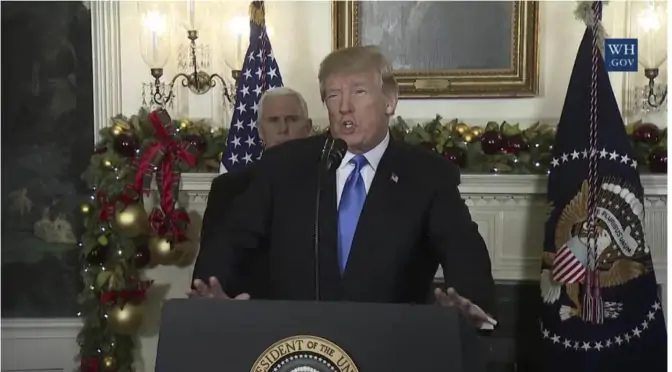On 6 December 2017, U.S. President Donald Trump declared that the U.S. recognises Jerusalem as the capital of Israel and, as a result will move its embassy there (see sources below), while also reasserting commitment to the peace process and specifying that the U.S. would support a two-state solution, if approved by both the Israelis and the Palestinians. Despite stress on peace, this declaration is highly likely to add fuel to the fire in the Middle East.
The U.S. itself is well aware of this danger as the State Department has asked “staff to defer all but essential travel to Israel, Jerusalem and the West Bank until 20 December”, according to Reuters.
It is highly likely that the fragile equilibrium that was very slowly being rebuilt despite, for example, the Hariri crisis, where most actors showed restraints, and despite the remaining difficulties related to working towards a constructive peace in Syria will be shattered.
Indeed, with this move, the U.S. forces all actors to take strong stances, which they cannot not take, but which are most probably not in the interest of a more peaceful region. These stances will also make subtle diplomatic negotiations and convergence of interests, such as those for example that developed between Saudi Arabia and Israel more difficult (see e.g. Signals: China enters the Fray in the Middle East; Israel Unprecedented Interview; Saudi Arabia…).
As a result, tension has further escalated in the Middle East. Meanwhile, Israel’s position could become not more but less secure.
Considering the discussions which preceded the American President’s declaration, where most Western and Arab allies warned America against this move, a position confirmed by the first international reactions to the American declaration, we may wonder in which way the new configuration now created serves, or, on the contrary, deserves, American power and influence. The U.S. could increasingly be seen as still powerful indeed, however a power that must be contained because also ready to sow turmoil by not considering all consequences.
The coming chains of actions reactions thus triggered will need to be closely watched.
Impact on Issues and Uncertainties
? Actions, notably of Muslim actors, beyond statements (critical uncertainties)
➚ ➃ Middle East Tension
➙➚ Threat to Israel
➚ ? Test to U.S. influence and power
.
https://twitter.com/StateDept/status/938480034045558784
.
US asks officials to defer travel to Israel, West Bank to Dec. 20
WASHINGTON – The US State Department issued a cable to all its diplomatic posts worldwide on Wednesday asking its officials to defer non-essential travel to Israel, Jerusalem and the West Bank until Dec. 20 according to a copy of the cable seen by Reuters.
.
https://twitter.com/IsraeliPM/status/938477847525625856
https://twitter.com/IsraelHatzolah/status/938481689751408645
.
Frustration and fury among Arabs at Trump’s Jerusalem declaration
CAIRO/AMMAN/BEIRUT (Reuters) – Arabs denounced President Donald Trump’s plan to move the U.S. embassy in Israel to Jerusalem as a slap in the face but few thought their governments would do much in response.
Trump’s embassy decision: Palestinians declare three ‘days of rage’ across West Bank; Arab world outraged
Palestinian factions in the West Bank announced on Tuesday that they would carry out three days of protest across the West Bank over U.S. President Donald Trump’s expected decision regarding American policy on Jerusalem.
US’ Jerusalem move may trigger new clashes in region: Erdoğan
ANKARA A potential U.S. move to recognize Jerusalem as Israel’s capital may cause indignation in the Islamic world and lead to new clashes in the region, President Recep Tayyip Erdoğan said on Dec. 6. “Any such false step may cause indignation in the Islamic world, dynamiting the ground for peace and igniting new tensions and clashes,” Erdoğan said on Dec.
Trump to recognise Jerusalem as Israel capital, upending decades of U.S. policy
President Donald Trump on Wednesday will recognise Jerusalem as Israel’s capital and set in motion the relocation of the U.S. Embassy to the ancient city, senior U.S. officials said, a decision that upends decades of U.S. policy and risks fueling violence in the Middle East.


